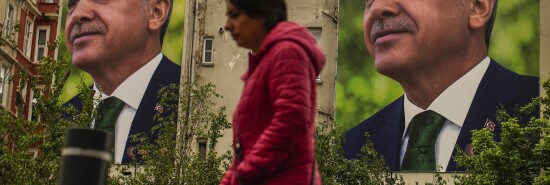
The ugly truth is that autocracy is often popular
Dan Hannan
Video Embed
Many American commentators are struggling with the idea that Turkey appears ready to reelect Recep Tayyip Erdogan, an autocrat who has harassed dissidents, closed hostile newspapers, and jailed opponents.
The New York Times says the final runoff will be a “nail-biter.” The Washington Post calls it a “knife edge.” In fact, Erdogan won the first round 49.5% to 44.9%, and, short of some black swan event, he will finish with a comfortable majority.
TAX PREPARATION INDUSTRY PUSHES BACK AGAINST IRS PILOT PROGRAM
Other critics, Turkish and foreign, talk of fraud, but this is pure cope. Turkey is not a country where election results are falsified. All sorts of other things might tilt the scales. Opposition politicians may be disqualified on technicalities, state media turned into partisan cheerleaders, and critical journalists silenced. But the integrity of the poll itself is not in doubt.
No, the harsh truth is that there is a market in politics for father-of-the-nation types, authoritarian strongmen who see criticism of themselves as unpatriotic, and who appeal more to people’s sense of communal belonging than to their material comfort and welfare.
Erdogan’s victory in the first round echoes that of Hungary’s Viktor Orban last year. Like Orban, Erdogan faced a coalition of critics ranging from socialists to ultra-nationalists. Like Orban, he was roundly denounced overseas as a dictator. Like Orban, he benefited from having an underwhelming opposition that was mainly popular with foreigners. Erdogan won, not by corruption, but by appealing to a blend of religion and nationalism, portraying himself as the defender of Turkish values against a mesalliance of secularists, socialists, national and religious minorities, and hostile foreign powers.
The idea of a loyal opposition, domestic critics who love their country but disagree with its government, does not come easily. In the Anglosphere, the concept evolved over centuries. But in many places, people struggle to see how you can criticize the regime without implicitly criticizing the nation.
In 1924, having abolished the Ottoman Caliphate and embraced Westernization, Mustafa Kemal Ataturk decided that the young Turkish republic needed European-style political pluralism. So he asked a group of friends, mainly old comrades from his army days, to establish an opposition party. They, knowing his temperament, begged to be excused, but Ataturk was having none of it. If Turkey was to be a proper democracy, he told them, it needed an opposition, and he wanted the opposition to be run by men he knew and trusted. Filled with misery and trepidation, his friends established the Progressive Republican Party. Six months later, the party was closed down and its leaders were behind bars.
We need to be taught why an opposition is a good thing because we are unlikely to stumble upon the answer intuitively. Oppositions keep governments on their toes. They ensure that political leaders are constrained by the thought that whatever powers they amass today might be in their opponents’ hands tomorrow. They allow unpopular leaders to be removed without anyone being exiled or shot.
If these observations seem trite to you, it is because of how you were educated. For most people, the advantages of multiparty democracy and limited government take second place to fiercer loyalties. Their party is full of good people, the other party is full of bad people, and ensuring that the good people are in charge matters more than abstract constitutional proprieties.
As this column regularly laments, this tendency is on the rise globally, bringing illiberal regimes to power around the world. In 2011, when the Arab Spring began, Turkey was the model to which the reformers aspired — a Muslim democracy based on the rule of law and parliamentary government. But, instead of the Arab states becoming more like Turkey, Turkey became more like them, concentrating power and reducing freedoms.
Illiberal democracy can take root in any culture. Erdogan has presided over an Islamic version of it, Orban over a Christian version, and India’s Narendra Modi over a Hindu version. Perhaps the most remarkable thing is that it has not spread even more widely.
CLICK HERE TO READ MORE FROM THE WASHINGTON EXAMINER
If you don’t think it could happen closer to home, you haven’t been watching. Both sides in American politics are ready to use any tools at their disposal to beat the other. The people who were chanting “Lock her up!” at Trump rallies are now scandalized at the thought that their guy might be on the receiving end of politicized charges. Each abuse is seen by the other side as a cause for escalation. The process is subordinated to the outcome.
“A republic, if you can keep it,” as Benjamin Franklin probably said. Can you, cousins? Can you?
